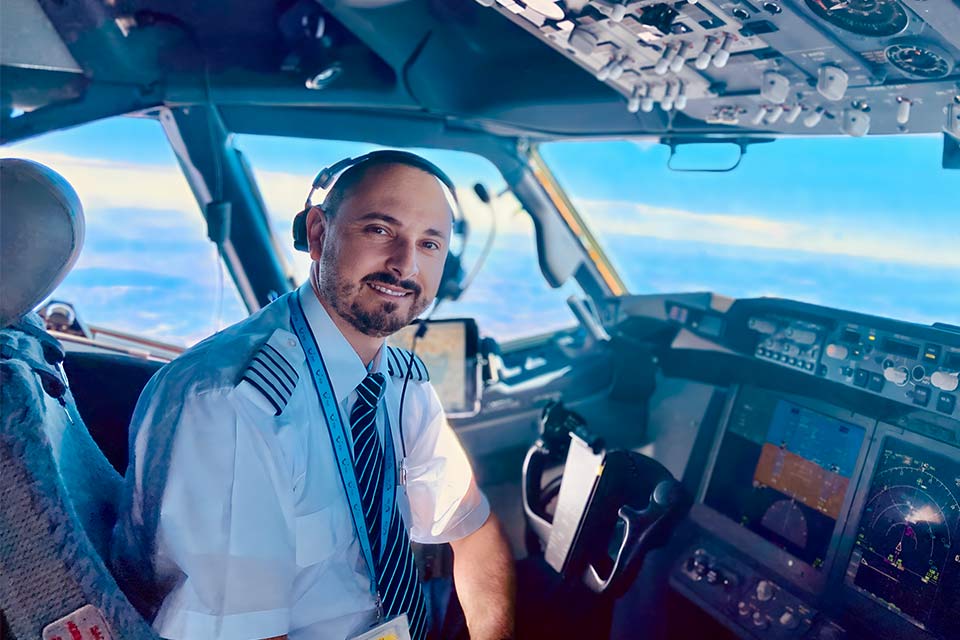Giuseppe Castrofilippo - Captain at TUI Airways
It was after the flight on a family trip to Sicily that Giuseppe decided he wanted to be a pilot.

“I was five years old and it’s an incredibly vivid memory for me. The aircraft was a BAC 1-11, and I still recall who the captain was. It was back when passengers were permitted to visit the flight deck whilst inflight. During my flight deck visit, the captain took my hand and put it on a control dial on the centre pedestal. We then rotated it left and the aircraft rolled gently to the left, then we moved it to the right and the aircraft rolled to the right. I remember thinking ‘I just flew the plane’; it was a very awe-inspiring moment.
“After getting off the aircraft I looked back and waved, the captain waved right back at me. He made such an impression on me that I knew, then, that I was going to fly aeroplanes and be just like him when I grew up”, he said.
Giuseppe obtained his private pilot licence in 2001 at the age of 17. He then came to Keele in 2002 and graduated in 2005 with a degree in Psychology and Criminology. He said: “I was undecided initially about going to university but in the aftermath of the terrorist attacks on September 11th 2001 the airline industry was in turmoil, and it was clear that pilot opportunities were scarce, so I came to Keele to study for a degree, which is also where I met my wife.”
After graduating he attained his commercial and airline transport pilot licence before becoming a flight instructor. In 2007 he started as a first officer with MyTravel Airways, which merged with Thomas Cook Airlines in 2008.
In 2017, at the age of 32 and after almost a decade as a senior first officer flying various Airbus and Boeing types on both short and long-haul routes, Giuseppe was promoted to captain. This is the most significant career milestone for an airline pilot.
Thomas Cook Airlines were flying millions of passengers all over the world but unfortunately the company ran into financial difficulties and collapsed in September 2019, which made headline news at the time. Shortly after, he was employed by TUI Airways as a captain based at Birmingham. Being able to remain in the UK with his young family, and his wife who also works professionally, was a priority.
Giuseppe has been a captain with TUI since November 2019 and regularly flies to short and medium haul destinations across Europe and North Africa, which include the Balearics, Greece, the Canaries, and Cape Verde Islands. It’s a position of great responsibility, and Giuseppe finds that his degree from Keele has been very useful in his line of work.
He said: “The way I would describe the job of a pilot, is that we are there to manage and make safe decisions. That is, to manage a complex machine, a team (your crew) and the operation as a whole. Also, to anticipate and mitigate matters that may pose a risk in what is a dynamic and often challenging environment; the goal being to provide a safe and seamless passenger experience. Pressures in aviation take many forms, such as adverse weather, human factors, on-time performance, commercial considerations, or the occasional problem with a passenger. Throughout all of this, the one thing you must never do is compromise on safety. It’s always safety first.
“There’s much to manage on a ‘normal day at the office’. It all begins with careful planning and briefing in the crew room before the flight. On a typical day, flying duties are shared between the two pilots. We will designate a ‘pilot flying’ for the outbound leg and the other will be the ‘pilot monitoring’, these roles are then reversed for the return leg. Takeoff and landing are the busiest phases of flight. During the cruise there is also plenty to do. This mainly involves maintaining a good degree of situational awareness and tactical planning. Having a contingency plan and knowing where the nearest suitable airport is, in case an urgent landing is necessary, is of paramount importance. A flight crew will be constantly reviewing this as the flight progresses. It is also during the cruise that pilots will plan and brief for the arrival to their destination.
“Certainly, studying psychology has been very useful, especially in my role as a captain. It has helped underpin my understanding of non-technical aspects of flying, such as human factors and crew resource management (CRM). These are both fundamental concepts in aviation. CRM is used by pilots to enhance safety on every flight by employing non-technical skills such as effective leadership & teamwork, good workload management, and sound problem solving & decision making. Combining these skills, together with the management of all resources available to you results in a safer operation, and accomplishing this is a fundamental part of the captain’s role. Aviation can be a fast paced and high-pressure industry to work in, but when things start to move too fast It’s knowing when to say ‘no’ or ‘stop’ that is the captain’s most important task.
“My degree from Keele has helped me a great deal during my career, especially in terms of furthering my understanding of human behaviour and how we respond in certain situations and to stressors that we may perceive. Appreciating our strengths, weaknesses, and other aspects of behavioural psychology is advantageous for enhancing safety in the flight deck. I always look back on my time at Keele with fond memories.”

